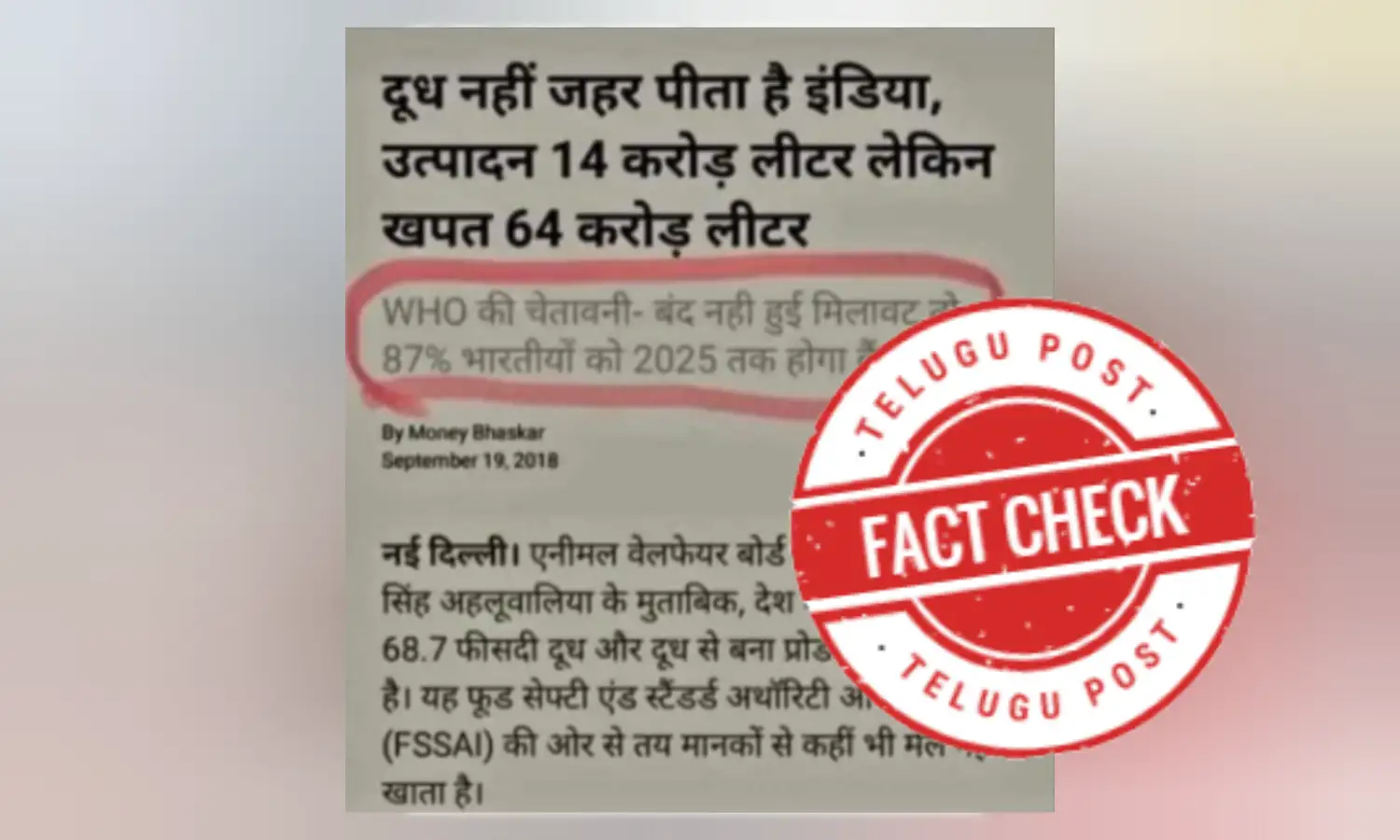Fact Check: WHO did not issue any advisory stating 87% of Indians could be at risk of cancer due to adulterated milk
WHO did not issue any advisory stating 87% of Indians could be at risk of cancer due to adulterated milk;

Cancer Epidemic
Cancer is on the rise in India with a significant increase in cases of brain and throat cancer. According to data from the World Health Organization, approximately 26 per cent of cancer patients in the country are affected by brain and throat cancer, raising serious concerns for India's healthcare system. A study involving around 1,869 patients provided this information, highlighting the growing severity of the issue.
Tobacco consumption among the youth is a major contributing factor to this issue. In India, approximately two-thirds of cancer cases are diagnosed at a late stage, although around 80 per cent of patients receive successful treatment.
Adulteration of milk could lead to digestive issues including nausea, vomiting, and diarrhoea. It can also damage mouth, throat, and digestive tract by causing chemical burns. Detergents also destroy milk proteins and vitamins and excessive consumption can harm kidney function.
In recent days, the discovery of pesticides in certain spices has caused worldwide concern. Several media outlets have reported that various countries have imposed bans on these contaminated spices due to the high potential for cancer risk associated with their consumption. The incident has sparked a global outcry, as health authorities work to prevent further exposure to the harmful substances.
A graphic has gone viral on social media, stating: "Shocking Revelation: India Consuming Poison Every Morning Instead of Milk. A staggering 68.7% of the milk sold in the country is found to be adulterated, raising alarms and prompting a warning from the WHO."
Users have shared this graphic with the caption: "The World Health Organization has issued a warning that by 2025, 87% of Indians will suffer from cancer due to the consumption of adulterated milk."
These claims have already been shared in the past.
Also, we found Dainik Bhaskar, published an article related on it. In the article, Dainik Bhaskar mentioned, 'चौंकाने वाला खुलासा : रोज सुबह दूध नहीं, जहर पी रहे हैं आप... क्योंकि देश में बिकने वाला 68.7 फीसदी दूध निकला नकली; WHO ने भी जारी की चेतावनी' ।
In English it reads: “Startling news: Every morning, you are not drinking milk but poison. Over 68.7 per cent of the milk sold in the country is counterfeit. This alarming statistics has led to an advisory from the World Health Organization (WHO) to the Government of India regarding milk adulteration.”
In the article, Dainik Bhaskar mentioned, WHO ( World Health Organization ) given an advisory to Government of India Regarding the Milk Adulteration. In the advisory, WHO warned that if this issue is not addressed, 87 percent of the population could suffer from cancer.
Fact Check :
Our investigation has determined that the claim regarding WHO issuing an advisory on milk adulteration is false.
In a clarification published by WHO, it stated, "Contrary to reports in some media outlets, WHO would like to confirm that it has not issued any advisory to the Government of India concerning the adulteration of milk or milk products."
Additionally, a press release from the Ministry of Fisheries, Animal Husbandry and Dairying, available on the Press Information Bureau (PIB) website, also clarified that no such advisory had been issued by WHO.
Moreover, PIB Fact Check has debunked the claim that 87 percent of Indians are expected to suffer from cancer by 2025.
Furthermore, PTI News conducted an investigation and published a report stating, "No, WHO has not issued an advisory on milk adulteration in India; the viral newspaper clipping is fake."
Another article titled "No, WHO Did Not Say 87% of Indians Will Get Cancer From Adulterated Milk by 2025" was published by The Quint.
Hence, we found the claim is false. The World Health Organization has not issued any advisory indicating that 87 percent of Indians will develop cancer by 2025 as a result of adulterated milk.

